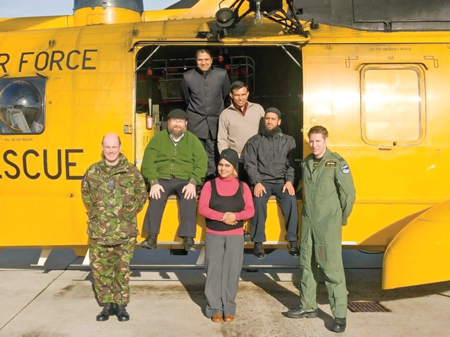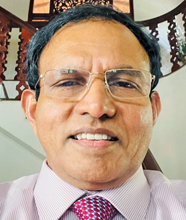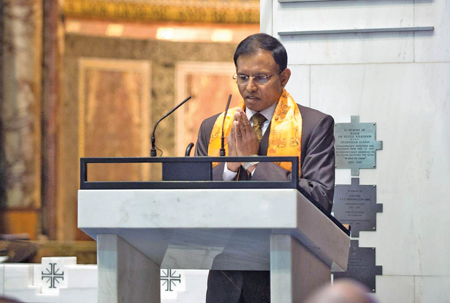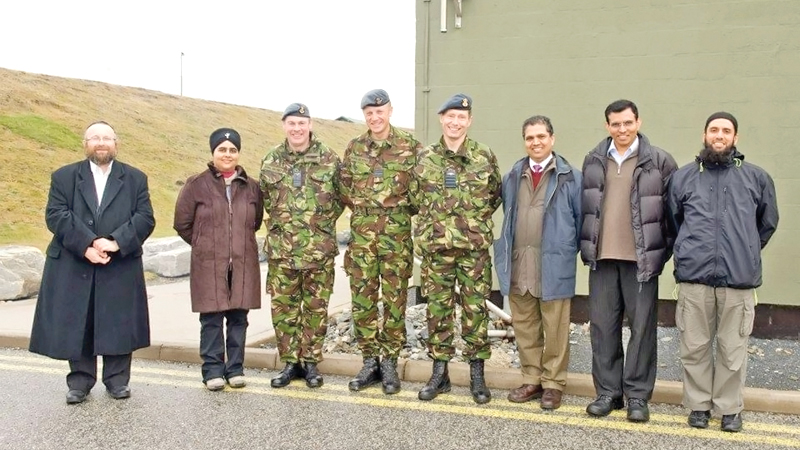 In an exclusive interview with the Sunday Observer, we had the privilege of sitting down with the first Buddhist Chaplain to His Majesty’s British Armed Forces, Dr. Sunil Kariyakarawana, who has served with distinction for the past 14 years. As a spiritual advisor to the British military, including the Commander-in-Chief, King Charles, his insights into mindfulness, mental health, and integrating Buddhist principles into modern life are eye-opening. He invites us to question whether it is medication or meditation we need in this modern world to heal us.
In an exclusive interview with the Sunday Observer, we had the privilege of sitting down with the first Buddhist Chaplain to His Majesty’s British Armed Forces, Dr. Sunil Kariyakarawana, who has served with distinction for the past 14 years. As a spiritual advisor to the British military, including the Commander-in-Chief, King Charles, his insights into mindfulness, mental health, and integrating Buddhist principles into modern life are eye-opening. He invites us to question whether it is medication or meditation we need in this modern world to heal us.
 Q: Could you tell us about your early academic journey, starting from your time at the University of Kelaniya to your PhD at Cornell University? What inspired you to pursue a career in linguistics and cognitive studies?
Q: Could you tell us about your early academic journey, starting from your time at the University of Kelaniya to your PhD at Cornell University? What inspired you to pursue a career in linguistics and cognitive studies?
I was fascinated by the capacity of humans, particularly Chomsky’s work, like generative grammar, which led me into the general area of cognitive psychology. I went to Canada and studied at the University of Ottawa, where I earned my Master’s degree.
America offers incredible opportunities for exploration, learning, and growth. Cornell University, with its vast 500-acre campus, was a wonderful place where I made many friends, held an assistantship, and received support from fraternities and scholarships.
Q: So, what did you particularly study for your PhD?
What I studied was long-distance dependencies in grammar. What we commonly refer to as grammar is the convention, but the real grammar is the cognitive framework. Language competence, and where it comes from, suggests that language is not something acquired but is inborn and inherent. It’s like as you develop your hands and legs, language develops as well—it’s a human, species-specific property. I was very interested in how human language interfaces with AI and all of that. So, long-distance dependency was the focus of my thesis.

Dr. Sunil Kariyakarawana
After earning my PhD, I transitioned into clinical studies while teaching at UCL. I received Fellowships in Japan and at University College London, conducting research in cross-cultural clinical linguistics.
I came across an advertisement for the Buddhist Chaplain role at Her Majesty’s service, where applicants from 18 Buddhist nations applied. Encouraged by London Buddhists who knew I had been teaching meditation, I decided to apply. During my time in America, I frequently visited the B.F.C. meditation center in Massachusetts, initially drawn by the free food but eventually finding a community focused on mental health and well-being. This experience marked my transition from linguistics into clinical and cognitive studies.
Q: How did the shift happen from cognitive studies to mindfulness meditation?
Some of the issues I encountered were psychological damage due to PTSD and other shocking experiences. I wanted to help people and encourage them to meditate because it can rewire your brain and promote relaxation. At Oxford, for instance, the Mindfulness Centre has done research and found that the human brain, while sophisticated, is also incredibly fragile.
To illustrate, if a deer encounters a life-threatening situation, it might run away, but soon after, it goes back to normal as if nothing happened. Humans, on the other hand, tend to get stuck when they have a bad experience. We might need at least two years of psychotherapy to recover. This makes us much more vulnerable and susceptible to various issues. Physical ailments can be diagnosed easily, but mental damage, childhood scars, and other intangible issues are much harder to understand.
The Western world is now paying more attention to mental health, partly because heart disease, once the number one killer, has been overtaken by dementia. This means people are losing their minds before they lose their hearts. Dementia used to be considered an old man’s disease, but now its onset has started as early as 30 or 40 years of age, which is alarming.
Dementia has both congenital and later-acquired causes. However, research has shown that if you exercise and cultivate your mind properly, as the Buddha advises, you can delay its onset. Stress, anxiety, and depression are all contributory factors. This growing concern is why I was drawn to this area.
While I remain deeply interested in cross-cultural research, most of my time is now dedicated to mental health and therapy. As the Buddhist advisor to the Ministry of Defence, overseeing the Army, Navy, and Air Force, I’ve shifted my focus from books to people. Engaging with people, especially those carrying significant responsibilities, through helping, talking, and listening has become incredibly rewarding and valuable in my work.
Q: What does your current role as the Buddhist Chaplain to His Majesty’s British Armed Forces entail?

Lecturing to the late Queen Elizabeth II
My role involves providing spiritual, pastoral, and moral guidance to soldiers, sailors, airmen and women, serving members, and their dependents. They seek my guidance and support, and providing pastoral care is a significant part of my work in the armed forces.
We have about 300 Christian chaplains, known as Padres, who offer similar support from a Christian perspective. My role is to provide this guidance from a Buddhist perspective. Members of the armed forces who identify as Buddhist in their Joint Personnel Administration (JPA) system come under my care for spiritual guidance and support.
In my day-to-day work, I advise and listen to these people, providing a sort of counselling. I also work with the chain of command and the broader community, often acting as a bridge between the two.
In the UK, there has been a strong focus on mindfulness over the last 30 years, particularly in areas like education, healthcare, the workplace, and the criminal justice system. The Government has recognised the importance of mindfulness at a policy level, seeing it as a way to increase happiness and help those with mental health issues. This demand for mindfulness fits well within my role, where I promote and advocate for its use, especially in education.
Q: With the rising awareness of mental health issues globally, how do you see the role of mindfulness in addressing these challenges?
Mindfulness is very attractive because it’s a form of self-help; one can develop their own practice. This has led to mindfulness becoming a billion-dollar industry in the U.S., with many Fortune 500 companies employing mindfulness instructors. In the UK, the salary for a mindfulness instructor reflects its value, with positions paying around £39,000. It’s a privilege to be trusted with helping people with their personal issues, and it’s a job I find very rewarding.
I believe that mindfulness is essential, especially in the 21st century, which I see as the millennium of the mind. If we consider the state of the world, many conflicts could be resolved if people had the skills to be kind, gentle, considerate, and willing to listen. Unfortunately, many of our dialogues have turned into monologues. We have spaces in our homes designed for comfort and relaxation, but what space do we have to cater to our minds? A place for meditation, where one can sit down and relax, is absolutely essential.
Q: Given your extensive background in clinical linguistics and cognitive studies, how do you think language and communication can influence mental health and mindfulness practices?
Communication, especially within a community, plays a crucial role in mental health. A fundamental aspect of communication is listening—developing an ear to truly hear people’s concerns and being sympathetic or empathetic towards them. This is incredibly important. We often talk about the importance of communication, but we don’t necessarily implement it in our daily lives.
 When people sit together, listen to each other, and find common ground, they can resolve many issues. Sometimes, just having someone to listen to you can be a huge relief, and often, the problem diminishes simply by being heard.
When people sit together, listen to each other, and find common ground, they can resolve many issues. Sometimes, just having someone to listen to you can be a huge relief, and often, the problem diminishes simply by being heard.
Q: What are some of the most common mental health challenges you encounter within the military, and how do you approach them from a Buddhist perspective?
The military is a tough environment because soldiers are trained in a particular way that sometimes conflicts with what I preach. Some have even told me that being a Buddhist advisor in the military is like being a vegetarian in an abattoir. But at the end of the day, they are human beings. Beneath their uniforms, boots, and tough exteriors, they are just like everyone else, they have the same needs and vulnerabilities.
When military personnel encounter problems, they might either break down completely or become hardened, similar to how an egg hardens under heat while butter melts. The military is indeed a tough place, but I’ve found that Buddhist teachings, which have been around for 2,500 years, still offer so much that the world can benefit from, especially in the area of mental health.
Even those who are considered tough, like military personnel, are receptive to these teachings. This is reflected in the growing number of Buddhists in leadership positions within the military. When I joined in 2005, there were only about 220 Buddhists. Now, the number has steadily increased to over 6,000.
Even among those who aren’t Buddhists by birth, the core values of courage, discipline, integrity, and loyalty resonate deeply. These values aren’t exclusive to any one religion. In the military, where people of different faiths work together, mutual respect is key. My role is not just to preach Buddhism but to offer guidance that is informed by faith, helping everyone, regardless of their background, to live in harmony and perform their duties with sincerity.
Q: What future directions do you see for the integration of Buddhist principles and practices in modern healthcare, particularly in mental health?
Mindfulness has already made significant inroads in modern healthcare, especially in the West. Unlike in Sri Lanka, where mindfulness is often talked about but not systematically implemented, in many Western countries, schools and medical institutions already have mindfulness instructors and mentors. This mirrors the Christian tradition of having a spiritual friend or guide, which is a wonderful practice. Buddhism, being inclusive and open, can contribute significantly in this area. The Buddha said, “I don’t want to convert you from one religion to another, but I want to help you find a better way of living.” This resonates with many people, making Buddhism the fastest-growing religion in the West.
Buddhism’s principles, like doing good, avoiding harm, and purifying the mind, align with universal values, creating common ground for integration into healthcare practices.
How do you define happiness and what is the greatest misconception about happiness in the modern world?
Happiness, at its core, is a state of contentment and inner peace. It is not simply the fleeting pleasure derived from external circumstances but rather a deep sense of fulfillment that comes from being at ease with oneself and one’s life. The Buddha beautifully summarised this with the phrase Santhutti Paramandanan, which means “contentment is the highest wealth.” This suggests that true happiness arises from being content with what you have, regardless of material wealth.
Our minds are not necessarily designed to make us happy by default. On a daily basis, we process about 100,000 thoughts, and research suggests that 90 percent of these are negative. So, cultivating happiness is a skill that must be developed and practised. It’s not about waiting for happiness to come to you or trying to buy it from someone else. Instead, it’s about training your mind to find happiness internally.
The greatest misconception about happiness in the modern world is the belief that it can be achieved through external means: accumulating wealth, possessions, or status. Many people chase after material success, thinking that it will bring them lasting happiness, but often find themselves unfulfilled even after attaining these things. The truth is that happiness is more about cultivating a sense of inner contentment and gratitude for what you already have, rather than constantly striving for more.
This is a skill that needs to be developed early in life, alongside your career goals. Take time to enjoy the simple pleasures: going for a walk, growing vegetables, or spending time with loved ones.
Q: What are your future plans and projects, particularly in mindfulness-based ecotourism?
I believe Sri Lanka has the potential to become a leader in innovative tourism. While we’re known as one of the top tourist destinations globally, there’s an opportunity to move beyond traditional tourism. Instead of visitors being passive observers, we should invite them to become active participants. For example, some of my friends from the UK are interested in coming here not just to sightsee, but to engage in activities like plucking tea, making cinnamon, and immersing themselves in our rich cuisine culture.
My concept is to develop mindfulness-based ecotourism. Ecotourism is already a significant subject, and by integrating mindfulness, we can offer something truly unique. Imagine taking people to places like Sinharaja Forest, where they can experience different climates and destinations within just two hours. We have so much to offer, but often take it for granted. Instead of bringing tourists to another concrete jungle in Colombo or just to the beach, we could promote a deeper, more meaningful engagement with our natural and cultural heritage. This approach could help us rethink and revisit our tourism goals, making Sri Lanka a pioneer in mindfulness-based ecotourism.
****
10 Tips for Mindfulness and Happiness
1. Understand Happiness
Recognise that happiness is a skill that requires practice and effort.
2. Daily Mindfulness
Incorporate mindfulness into everyday activities—be present when eating, walking, or engaging with others.
3. Positive Thinking
Train your mind to focus on the positive; counter the natural tendency for negative thoughts.
4. Create Joyful Habits
Identify and regularly engage in activities that bring you peace and happiness, like yoga, walking, or spending time with loved ones.
5. Self-Awareness
Use mindfulness to become more self-aware, helping you make necessary adjustments in life.
6. Mental Well-being
Mindfulness offers an alternative to medication by empowering you to manage your own mental health.
7. Simplicity in Living
Cultivate contentment with what you have, rather than constantly striving for more.
8. Compassionate Communication
Practice listening and empathetic communication to foster better relationships and reduce stress.
9. Mind as a Friend
A well-directed mind is your best ally; nurture it for improved happiness and mental health.
10. Inner Peace
Focus on inner contentment and gratitude, rather than seeking happiness through external achievements






